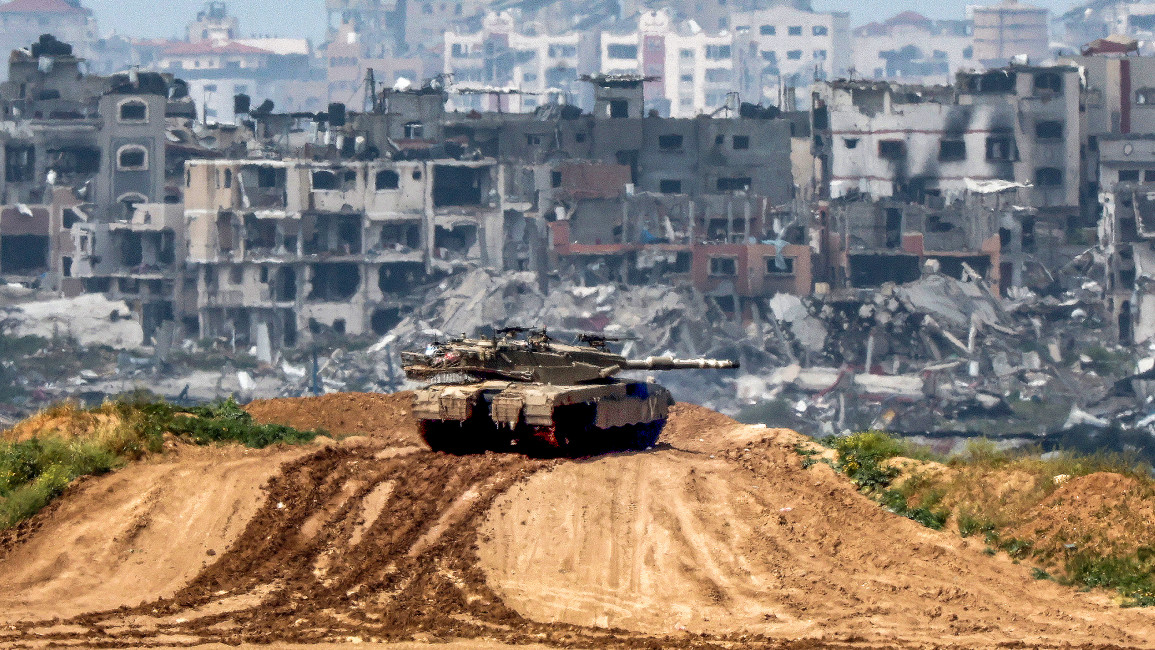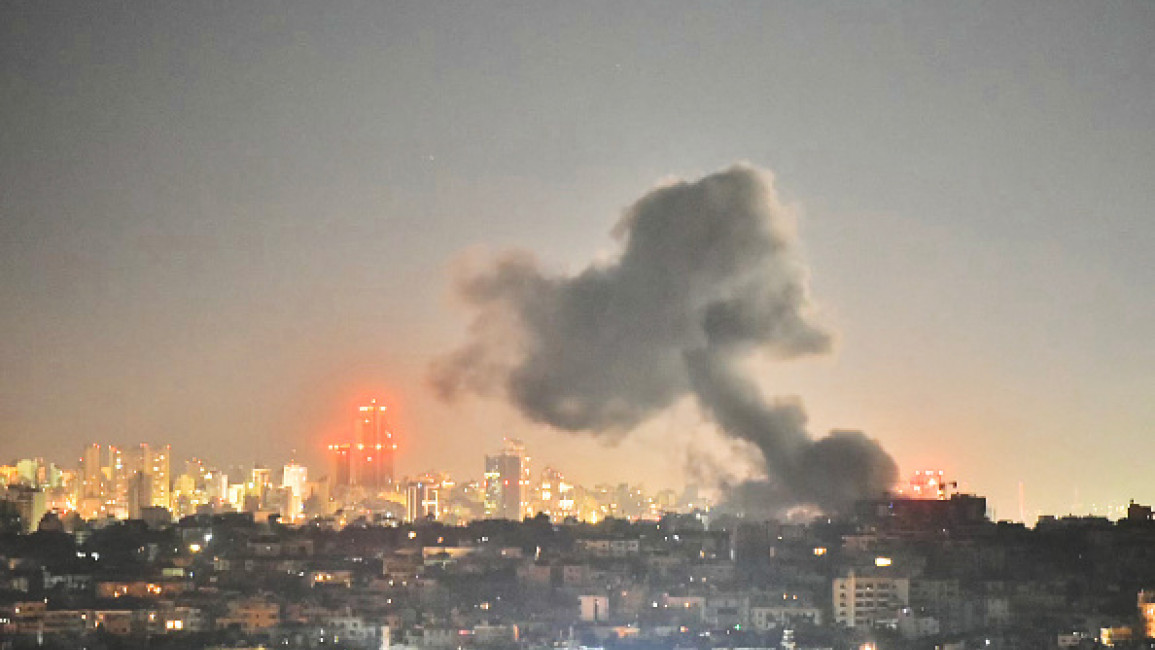
Does Israel have a regional strategy beyond endless war?

Hamas shocked the world on 7 October 2023 when it launched an unprecedented attack on Israel, resulting in nearly 1,200 Israeli fatalities, both soldiers and civilians.
The attack marked a significant moment in the Israeli-Palestinian conflict, challenging Israel's longstanding military and intelligence dominance, which had always largely dictated the rules of engagement.
Israel responded with heavy airstrikes on the Gaza Strip, and in less than a month, it launched a ground invasion.
Over the past year, Israel’s operation has continued to expand under the pretext of “eliminating Hamas”. The brutal war has resulted in nearly 43,000 Palestinian deaths, mostly women and children, and widespread infrastructure destruction. It has also led to the forced mass displacement of around 1.9 million Palestinians.
The conflict also began spilling over to neighbouring countries, raising concerns of a broader regional war as tensions escalated.
But now that a year has passed since 7 October, and following the death of Hamas leader Yahya Sinwar in Gaza last week, how close is Israel to reaching its strategic goals in Gaza and beyond?
According to researcher Antoine Shalhat, following Sinwar’s death, some analysts were quick to view it as a potential opening for a ceasefire in Gaza and a chance to negotiate the release of around 100 Israeli hostages held by Hamas and other factions.
However, while the broader consequences of Sinwar’s death remain uncertain, such optimism seems misplaced, overlooking the deeper issues and motivations driving the conflict.
“For Hamas, losing its political leader Sinwar, just months after the assassination of Ismail Haniyeh in Tehran, is a setback for the group's leadership structure. However, Hamas remains adaptable, with its decision-making spread across a network of leaders both inside Gaza and in exile,” Shalhat told The New Arab.
Israeli leaders are manoeuvring to avoid a final ceasefire agreement, Shalhat argues, aiming to protect their operational gains and minimise the concessions they may be forced to make in future negotiations.
“They remain wary of those responsible for the 7 October attack - veteran militant leaders shaped by years of imprisonment, who have grown familiar with the weaknesses of the Israeli military and leadership,” he added.
These figures, deeply driven by a desire for retribution and an unwavering belief in Israel’s vulnerability, pose a unique threat. Israeli officials are keen to prevent them from becoming key players in any prisoner exchange, fearing that their release could embolden future attacks and replicate the horrors of 7 October on a new date.
|
|
Israeli affairs expert Ibrahim Abu Jaber told The New Arab that for all the destruction Israel has caused in Gaza, “it is nowhere near achieving any of its plans”.
According to Abu Jaber, all military confrontations between Palestinian resistance factions and the Israeli army are “asymmetrical,” given the disparity in capabilities and resources available to both sides.
“Yet, for all its might, the Israeli army has failed to achieve a decisive victory in these encounters, as seen in the failure of the Swords of Iron operation,” he said. “Israel is still beset by fear, tension, and existential anxiety since Hamas, while weakened, remains a force to be reckoned with.”
As for Israel’s “relentless use of excessive force,” military and security expert Jamal al-Khalid argues that it will only “exacerbate resentment, mobilise resistance, and fuel further hostility among generations of the oppressed,” whether in Gaza or the increasingly volatile West Bank.
“While Israel's current military power may create a sense of dominance and control in the short term, such a perception becomes misleading when considering the long-term implications,” he told The New Arab.
If Israel wishes to emerge from the war with minimal losses, Jaber agrees that its government must pivot towards political and diplomatic options for conflict resolution.
“Israel has faced increasing international isolation since the war in Gaza, and with mounting global criticism of its military actions in Lebanon, which have resulted in a staggering number of civilian casualties, the pursuit of political and diplomatic solutions based on clear strategic goals is becoming ever more urgent,” he told The New Arab.
“Short-term tactical victories are meaningless without achieving a political settlement to end the conflict and spare the region from the looming war.”
A multi-front war
Since 7 October last year, Israel's handling of the multi-front conflict involving Gaza, southern Lebanon, Yemen, and Iran has demonstrated the use of overwhelming military force bolstered by support from the United States and international silence, according to al-Khalid.
At the outset of the conflict, Hezbollah sought a balanced approach between limited retaliation and full-scale involvement, exerting pressure on Israel, which, as a consequence, caused the displacement of tens of thousands of Israelis in the north, the call-up of Israeli reserve forces, and the allocation of a third of its ground troops to the northern front, alongside half of its air defences.
The intensity of clashes, however, gradually escalated, and by February, Hezbollah's rocket fire surpassed that from Gaza.
In recent months, Israel carried out surprise strikes that inflicted significant human and material losses on its adversaries, most notably through the assassinations of top resistance figures including Hassan Nasrallah, the secretary-general of Hezbollah.
As the aerial bombardment continued, the Israeli military announced in early October that it had initiated "limited" ground operations in southern Lebanon, which could expand into a broader, long-term offensive given the recent deployment of thousands of additional troops to the north.
Security and military analyst Hesham al-Maghary points out that Israel's regional policy is underpinned by its military superiority.
“On the technical and intelligence front, Israel dealt a severe blow to Hezbollah with an operation involving the detonation of beepers, resulting in the deaths of dozens of the group's operatives and hundreds of civilian casualties,” he told The New Arab.
“Israel’s aerial prowess is also formidable, with a fleet that includes advanced fighter jets like the F-15, F-16, and F-35, alongside high-tech drones capable of reaching any target.”
|
|
Mahmoud Mardawi, an expert in Israeli and security affairs, commented on Israel's strategy of swift military action in Lebanon and Gaza, stating that its “outcomes vary depending on the overall situation and conditions” on the ground.
“At the start of the military campaign in Lebanon, Israel's objectives were clear: push Hezbollah beyond the Litani River, return displaced northern residents, and separate the southern and northern fronts. To achieve these goals, Israel employed tactics of shock, intense firepower, and targeted assassination,” Mardawi said, adding that Netanyahu aimed to "dismantle Iran’s proxies" and reshape the Middle East's geopolitical landscape to favour Israel.
However, he noted that Israel's repeated efforts to realise these ambitions have run into obstacles.
"The assumption that Israel has no objectives needs to be reconsidered," he said, adding that while Israel set its sights on military victories, it has struggled to achieve decisive outcomes. This is largely due to Hezbollah's strategy of attrition, which involves dispersing Israeli forces and exploiting time and space to exhaust the adversary.
Over the past two and a half decades, this approach has proven successful, leaving Israel unable to secure a clear victory. Mardawi argued that the group remains resilient, continuing to "inflict painful blows” on Israel.
“Hezbollah's ideological foundations, the resilience of the Lebanese people, and the group's well-established capabilities have made it difficult for Israel to achieve a decisive military victory in open battles, especially when met with sustained resistance,” he added.
The same challenges extend across other fronts, such as Iraq, Syria, and Yemen.
In Yemen, the Houthis launched attacks on Israeli positions using missiles and drones while targeting over 200 ships in the Red Sea since mid-November last year, according to US Central Command estimates.
The strikes have prompted significant shipping companies to halt passage through the Red Sea, raising concerns for Israel and its allies.
In response, the US, Britain, and Israel carried out airstrikes against Houthi sites in Sanaa, Dhamar, Hodeidah, and al-Bayda, to which the group retaliated by declaring all American and British vessels legitimate targets, extending its attacks to ships traversing the Arabian Sea and Indian Ocean or any area within the reach of its weaponry.
Mardawi pointed out that the Houthis possess significant human resources and that "the harsh Yemeni environment has forged a resilient mindset within its people".
What's next for Israel?
Abu Jaber argues that the United States is incentivising Netanyahu to intensify his multi-front escalation.
“With the US presidential election approaching, decision-making from the White House has become relatively disengaged, particularly on issues concerning Israel and Palestine,” he said.
“Netanyahu may attempt to exploit this political vacuum to settle scores, possibly leading to a significant military strike against Iran in response to the attacks it launched earlier this month.”
However, he warns that a significant strike on Iran could ignite the entire region, which is already bracing for the possibility of a large-scale regional war with unpredictable outcomes.
“Iranian leaders, including the Supreme Leader and top military and Revolutionary Guard officials, have repeatedly vowed a firm response to any reckless Israeli attack, mainly if Israel targets Iran’s nuclear facilities,” he added.
According to Mardawi, Israel’s current strategy would be impractical to implement against Iran due to the geographical distance, Iran’s vast capabilities, and its extensive experience in conventional warfare.
He further noted that Iran has become adept at surviving under unprecedented sanctions, having built its self-reliance in critical sectors.
This article is published in collaboration with Egab.





 Follow the Middle East's top stories in English at The New Arab on Google News
Follow the Middle East's top stories in English at The New Arab on Google News


